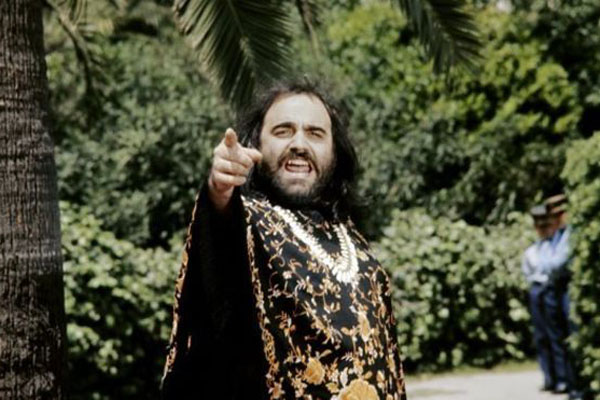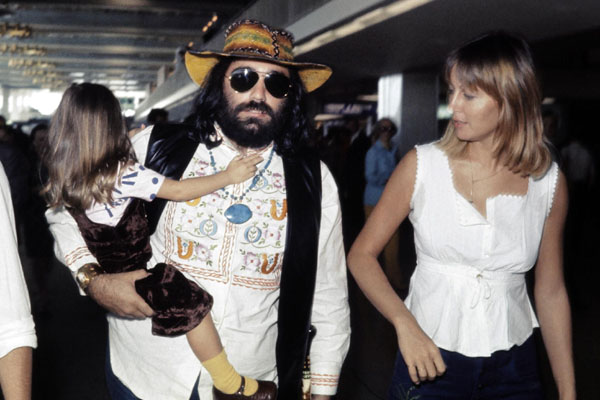Celebrated internationally and praised in Greece, Demis Roussos (15 June 1946 - 25 January 2015) engraved himself in the hearts of Egyptian listeners to a remarkable extent — so much so that he is one of a handful of European singers who are household names in Egypt.
He was helped by the sun-kissed, Mediterranean pop and the romantic ballads (sometimes benefiting from Oriental accents) that he performed. He was also helped by the the 1970s nostalgia for earlier, more cosmopolitan times.
Artemios “Demis” Ventouris-Roussos was actually born in Alexandria, then a melting pot of cultures and religions, on 15 June 1946. Mixing with Armenians, Syrians and Italians as well as Egyptians, Roussos attended a Greek school and performed in the Byzantine Church choir. When his family was pushed out of the country and back to Greece by the Suez War in 1956, Roussos’ was only 10.
Roussos was paid special attention in Egypt when he emerged on the world stage and his songs appeared at the top of the charts, but even in the 1980s when new tastes challenged his world standing, he continued to be a legend in Egypt. On his infrequent visits his concerts were huge hits, and the 1970s Egyptian band Les Petits Chats, who even accompanied Roussos on one of his rare appearances in a Cairo hotel in 1980, regularly played covers of his songs.
As the years went by Roussos’ voice continued to fill air time on the Egyptian radio, particularly on French- and Greek-language programmes. His albums sat next to those of Egypt-born singers like Georges Moustaki (a Frenchman of Italian-Greek origin), Dalida (the Italian-French star) and Claude Francois (a Frenchman).

Demis Roussos in early years of his career (Photo: AFP)
In the early 1990s Roussos gave an important concert at the Cairo Opera House. The Main Hall was filled with older devotees for whom he defined the musical culture, but as a young wannabe journalist the concert had a different significance for me: having interviewed Roussos backstage, I put together the first article I was ever to publish in Egypt (written in French). I don’t recall much of the conversation, nor have I managed to trace the article. But the sense of nostalgia — a whole generation’s melancholy — was palpable.
As a world figure the singer’s days of glory were long gone, but he was showered with unconditional affection, and together with the mystery that surrounded Roussos — the question of whether his mother was the Italian-Egyptian actress Nelly Mazloum, an idea widely believed in Egypt and supported by Wikipedia until recently — this added to the weight of the moment. I remember asking Roussos about his mother. He replied that his only connection to Egypt was that he was born here, not clarifying further.
In his 1982 book A Question of Weight, however, Roussos writes, ”I was born on the 15th of June 1946 in Alexandria, of Greek parents who had lived in Egypt for two generations. Olga, my mother, was born into a merchant family who left Greece to seek their fortune in the East.”
Roussos mentioned Olga in many television interviews. In one, he recalls her beautiful voice, the many arias she had memorised and the lullabies she composed on the spot to sing to the young Demis. In a short documentary about him released in the early 1980s, he reveals, “My father and mother were both artists. I remember my father always with a guitar. He was the heart of the party, playing all the time. People would come to the house, always singing, always having fun.”
Regardless of his family background, it is to his unique talent — his one-of-a-kind voice and inimitable on-stage charisma, as well as his deep passion for and dedication to music — that credit for his fame must go. Nurtured by his parents, Roussos’ musical journey began in the household — he remembered being inspired by the famous trumpet plater Harry Haag James after seeing a movie about him — but in Greece, where his family were immigrants in their own country, Roussos initially performed to make a living. Along with him he had taken the cosmopolitan spirit of the city, and an ear that combined jazz with Arabic and Greek Orthodox influences.

Demis Roussosin 2006 (Photo: AFP)
In Athens, Roussos joined local bands such as the Wee Five, becoming the lead singer of The Idols. The band drew crowds to the club where it played, and it was there that Vangelis (Evangelos Papathanassiou), then a member of another band, first heard Roussos. Together with Loukas Sideras, the two musicians soon formed their own band, Aphrodite’s Child, whose song “Rain and Tears” took Europe by storm, selling over a million copies.
After three albums with Aphrodite’s Child — End of the World (1968), It’s Five O’Clock (1969) and, the most successful progressive rock album, 666 (1972) — Roussos went solo, proving his mettle with “We Shall Dance”, topping the international charts for weeks on end with “Forever and Ever” in 1976 and entering the Guinness Book of Records with over 15 million singles sold worldwide. As he was persistently moving towards the Mediterranean pop and romantic tunes, “Good Bye My Love Good Bye”, combining many languages, became among his best known numbers. “My Friend the Wind”, grounded in Greek music, became a hit all across Europe.
As his fame grew through the 1970s the singer put on weight and took to wearing the kaftans that would become his signature. They became progressively longer as Roussos’ girth increased, his weight reaching 148 kg at one point, despite repeated attempts at dieting. In a BBC interview from the 1990s, Roussos reveals that he tried all sorts of diets, all of which were effective for some time. The problem was his own failure to stay committed to any of them. Extra weight did not reduce his popularity, and it was in his longest kaftans that he performed many iconic songs, including “My Only Fascination” (1974) and “From Souvenirs to Souvenirs” (1975).
It was disco that his melodic nostalgia failed to compete with, in the 1980s, though he tried to cope with the demands of the market, performing a cover of Air Supply’s “Lost in Love” as a duet with Florence Warner, but it didn’t feel right, he said. Nor was it successful. His presence on the international scene began to shrink.
In 1985, while trying to garner what was left to him of the limelight, Roussos was flying from Athens to Rome when the plane was hijacked, reportedly by members of Hezbollah and the Islamic Jihad, and he was taken hostage. He was among the first to be released and in his interviews stressed how well he had been treated by the hijackers. Nonetheless the incident worked to his benefit as a celebrity.

Demis Roussos with his wife Monique and their daughter Emily at Orly airport in Paris in 1973 (Photo: AFP)
Months later, in 1987, recalling this experience while promoting his retrospective, two-CD album of French and English songs, The Story of Demis Roussos, he said that facing death had changed his life forever: ”I decided to come out with my own weapons, which are the guitar, the piano, the microphone, my soul and song. I started my rebirth with what I knew people loved, an album of all my songs from the last 20 years.”
The album was an attempt to rehabilitate the fame of a singer who, finding it hard to respond to new musical tastes, had to struggle to remain in the market. It may have worked for older fans, but for the younger generations the Roussos chapter had already been closed. He was never to be as famous again, but he never stopped singing or releasing new singles.
In late 2009, Roussos released Demis, not only his last album but also a great surprise to his fans. As if trying to catch up 30 years too late, he had shifted to rock. Sadly, the album was a flop, appealing to neither the new generation of listeners nor his older devotees.
Whether to Egyptians, to whom it bore echoes of cosmopolitan Alexandria, or to his fans in the west, who cherished its romanticism and melancholy, Roussos’ music always bore an element of longing. Nostalgia was embedded in the inimitable texture of his voice, with a captivating range including an almost falsetto register, as well as in his powerful stage presence. This was enough for the world to give him over a decade of unprecedented international stardom, it was enough for Egypt to give him longer. He remains in the hearts of many.
“I am in Athens, in dad’s home, between sea and mountain, where he died at night between Saturday and Sunday.” Thus Demis Roussos’ daughter Emily confirming news of her father’s death in hospital, at the age of 68, on 25 January 2015.
According to Paris Match, Roussos was suffering from stomach cancer, a condition that his family had kept from him following his diagnosis in April 2014. The illness was in such an advanced stage, it was thought that knowledge of his condition could only make his last days more difficult.
Demis Roussos was buried on 30 January in Athens, Greece.
This obituary was first published in Al Ahram Weekly on 5 February 2015.
For more arts and culture news and updates, follow Ahram Online Arts and Culture on Twitter at @AhramOnlineArts and on Facebook at Ahram Online: Arts & Culture
Short link: